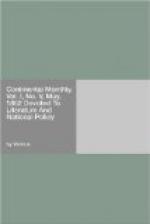of Mountains and Seas, it appears that the Esquimaux
and their country were well known to the Chinese,
and that in the sixth century, natives of the North
and of the islands bordering on America, came with
Japanese embassies to China. When it is borne
in mind that the early Chinese geographers and astronomers
determined on the situations of these northern regions,
with an accuracy which has been of late years surprisingly
verified by eminent European men of science, and when
we learn that the Year Books or annals of China continually
repeat these observations, and that their accounts
of the natives of the islands within a few miles of
the American shore are as undoubtedly correct as they
are minute, we certainly have good reason for assuming
that their description of the main land and its inhabitants
is well worthy, if not of implicit belief, at least
of an investigation by the savans of the Western World.
Be it borne in mind, also, that during the first eight
centuries of our own Christian era, a spirit of discovery
in foreign lands was actively at work all over the
East. In the words of Neumann:
’In the first century of our reckoning, the pride and vanity induced by the Chinese social system was partly broken by the progress of Buddhism over all Eastern Asia. He who believed in the divine mission of the son of the King of Kaphilapura, must recognize every man as his brother and equal by birth; yes, must strive (for the old Buddhism has this in common with the Christian religion) to extend the joyful mission of salvation to all the nations on the earth, and to attain this end must suffer, like the type of the God Incarnate, all earthly pain and persecution. So we find that a number of Buddhist monks and preachers have at distant times wandered to all known and unknown parts of the world, either to obtain information with regard to their distant co-religionists, or to preach the doctrine of the Holy Trinity to unbelievers. The official accounts which these missionaries have rendered of their travels, and of which we possess several entire, considered as sources of information with regard to different lands and nations, belong to the most instructive and important part of Chinese literature. From these sources we have derived, in a great degree, that information which we possess regarding North-eastern Asia and the Western coasts of America during centuries which have been hitherto vailed in the deepest obscurity.’
The earliest account, given of extended travels on the North-American continent describes a journey from Tahan or Aloska to a distance, and into a region which indicates the north-west coast of Mexico and the vicinity of San Blas. The following is a literal translation made from the original Chinese report, by Neumann:
’THE KINGDOM OF FUSANG, OR MEXICO.




